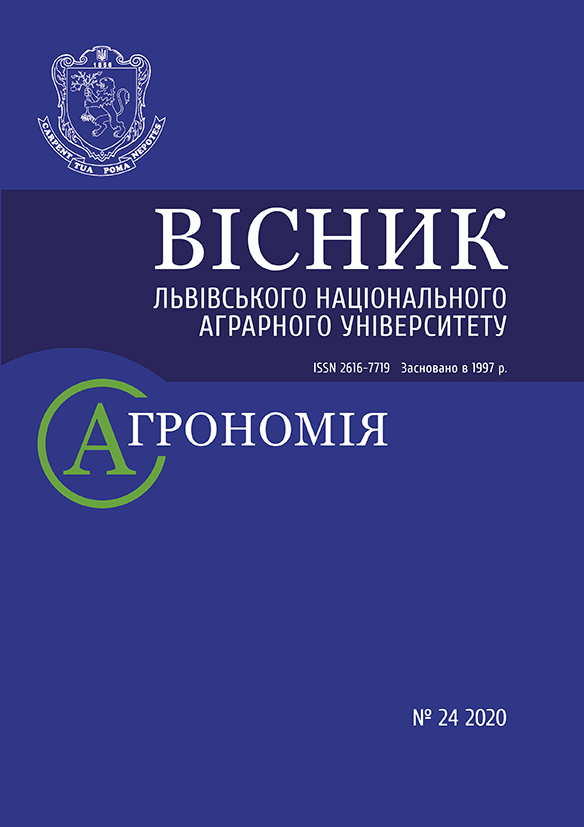Visnyk LNAU: Agronomy 2018 №22(2): 9-13
How the post-alcoholic bards impact density of straw pellets and intensity of biogas production
Zakhariv O., Doctor of Agricultural Sciences
Separated Subdivision of National University of Life and Environmental Sciences of Ukraine
“Berezhany Agrotechnical Institute”
https://doi.org/10.31734/agronomy2018.02.009
Annotation
The results of the study reveals one of the methods of using the post-alcoholics bards in production of straw pellets considering that those bards are the leftovers from production of alcohol for which special filtration fields used which therefore bring negative impact for agricultural lands. The post-alcoholic additives increase density in 8 mm made pellets after adding chopped and extruded wheat and rape straw. The intensity of biogas production from plant biomass, which consisted of extruded and pelleted wheat and rape straw, naturally increased from the 1st to the 28th day of the study. The highest intensity of biogas production was noted from the beginning to the 14th day of incubation. Therefore, the amount of biogas generated from the pellets of wheat straw on the 14th day of the experiment was 345 m3 per 1 ton of substrate, which is 74 % more than on the 7th day. Over time, in packets on the 21st and 28th days compared with the 14th day of the study, a slight intensity of fermentation processes was observed, which in turn reflected a slight increase in biogas volumes at this stage. As a result, on the 21st day the amount of biogas increased by only 7 %, compared with the 14th day; and on the 28th day – by only 12 %, compared with the 21st day. The same biogas generation pattern was kept in experimental groups, where wheat straw pellets were incubated with additives post-alcoholic bards. Conclusively, the process of biogas formation in packages with the rape straw was somewhat different from the packets of wheat straw. In this case, there was a gradual progress in increasing the volume of gas environment. So, on the 14th day compare to the 7th day the amount of biogas increased by 75 % and 60 % respectively. While in the control and experimental groups of packages, on the 21st day compared with the 14th day there was increased by 17 % and 16 % respectively; as in turn on the 28th day as to compare with 21st day – by 21 % and 18 %. These experiments show the possibility of using post-alcoholic bards in the form of 15 % additive of the production of straw pellets for biogas technologies.Key words
biogas, pellets, wheat straw, rape straw, post-alcohol bard
Link
- Shilova K. M., Ermokhin Yu. I., Shilova I. I. Effect of alcohol bard on agrochemical characteristics of soils and harvest of rye straw in northern Kazakhstan. Bulletin of OmGAU. Series "Agricultural sciences". 2016.№ 3(23). P. 72–76.
- Michalchenko S. A., Tsup V. I., Vasiliev A. P. Effectiveness of the use of condensed post-alcoholic bards for fattening bulls. Scientific and Technical Bulletin of IT NAAN. 2013. № 110. P. 117–123.
- Glovin N. M. Influence of alcoholic bards on agrochemical characteristics of soil. Influence of alcoholic bards on agrochemical characteristics of soil: Scientific herald of LNUVMBT named after S. Z. Gzhytsky. 2017. № 74(19). P. 192–195.
- Processing of waste from alcohol production, realization of biogas and produced electricity to distilleries by supplying raw materials for their production needs. URL: http://bibliofond.ru/download_list.aspx?id=511962 (Last accessed: 18.05.2018).
- Dyganova R. Ya., Belyaeva Yu. S. Development of methods for selecting technologies of processing waste of alcohol industry as an instrument of environmental management. Izvestiya of the Samara Scientific Centre of the Russian Academy of Sciences. 2014. Т. 16. №4(2). P. 1728–1736.
- Kuznetsov I. N., Ruchai N. S. Analysis of world experience in the technology of processing post-alcohol bard. Proceedings of BGTU. Series 2: Chemistry, technology of organic substances and biotechnology. 2010. Release XVIII. P. 294–301.
- Karanov Yu. A., Chumak Yu. V. Technological scheme for processing grain bard with the production of biogas. Modern technics and technology. 2014. Мay. № 5. URL: http:// technology.snauka.ru/ 2014/05/3563 (Last accessed: 17.05. 2018).
- Volokhova E. A. Combined processing of the post-alcohol cereal bard with the production of biogas and a valuable food product with high protein content. Master's dissertation. Moscow Technological University (MITHT). 2016. 78 p.
- Levko S. Results of experimental studies on the process of firming up the stems of plants’ materials. Visnyk of Lviv National Agrarian University. Series: Agro-engineering research. 2013. № 17. P. 130–137.



